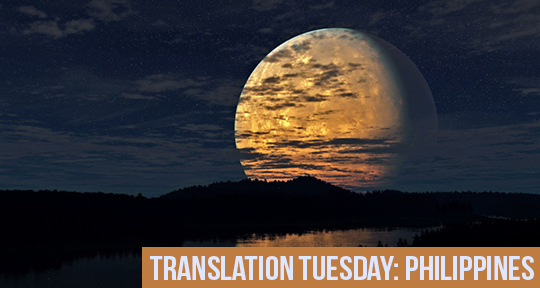In this week’s Translation Tuesday, a wish bestows the meaning of life in this allegorical prose poem by Mike L. Bigornia, excerpted from his award-winning collection, Dark Prose. A Diwata, a divine spirit of precolonial Filipino theology, grants a wish to the World of Beings, which includes the moon, the stars, the stone, and the wind. But the river wishes for something unusual—and she might not be the only one making the request. “Bestiary” is a thoughtful modern-day creation fable about the primacy of human intimacy.
This was the one and fateful hour. Though the Diwata be gracious, this was set to happen for the first and final time in the World of Beings.
Every being could make a wish to the Diwata but only once. Each granting of a wish lasts an entire night. So each wish should be of value; each fulfillment enough to stand the test of time.
That night, the Diwata went around the woods and listened to the wishes of the beings.
The moon made a wish and the Diwata giggled. The stone made a wish and it nodded. The wind made a wish and it puffed its cheeks. The stars made a wish and its eyes shone.
Until it saw the anxious river. “What is your wish, Beloved Child?”
“I want to know the meaning of life, Diwata. I believe I would find it once you give me breath.” The Diwata looked back, as if it had remembered something and gazed at the distance. But only for a moment. After, it smiled and turned back toward its companion.
Before the Diwata vanished, all the beings had made their wish. And before midnight, the river had now transformed to a beautiful maiden. Her complexion unblemished, fresh. Her hair flowed lavishly like waves. Under tonight’s unbelievable light from the clouds, her body seemed to glide through the woods.
What rare features, what rare sight! By her charm that surpasses the jasmine and the ilang-ilang, the cicadas resounded, the owls aroused in half-sleep, the civet made to sing.
She saw something not far off. A figure was approaching. And for the first time, she felt throbbing from inside her chest. Louder and louder it went, faster and faster, until a handsome youth appeared before her.
The youth’s gaze was downcast, and he seemed to be drifting. The youth’s fingers lured her on, and out his veins flowed the sparks of love. The youth laid her down on the green tufts, and the stars were thrilled; the wind caressed, embraced, and kissed along with them. The moon watched their wonderful lovemaking.
The youth slept soundly in delight. The maiden, still enamored, rose slowly. “Goodbye, Beloved, and thank you. Now I have known the meaning I yearned for.” She went away slowly, and she was taken in by the dense woods.
After a while, morning returned. And this strong youth touched by sunlight turned to stone in the middle of the forest.
Translated from the Tagalog by Bernard Capinpin
Mike L. Bigornia (1950-2001) was a Filipino poet, editor, and fictionist. Alongside Virgilio S. Enriquez and Teodoro T. Antonio, he was a founding member of the Galian sa Arte at Tula (GAT). He became chairman of Unyon ng mga Manunulat sa Pilipinas (UMPIL), and presided as adviser to Linangan sa Imahen, Retorika at Anyo (LIRA). He won several literary prizes including the SEA Write Award from the King of Thailand in 1996. His books include Punta-Blangko (1985), Prosang Itim (1995), and Salida (1995).
Bernard Capinpin is a poet and translator. He is currently working on a translation of Ramon Guillermo’s Ang Makina ni Mang Turing. He lives in Quezon City.
*****
Read more on the Asymptote blog:

